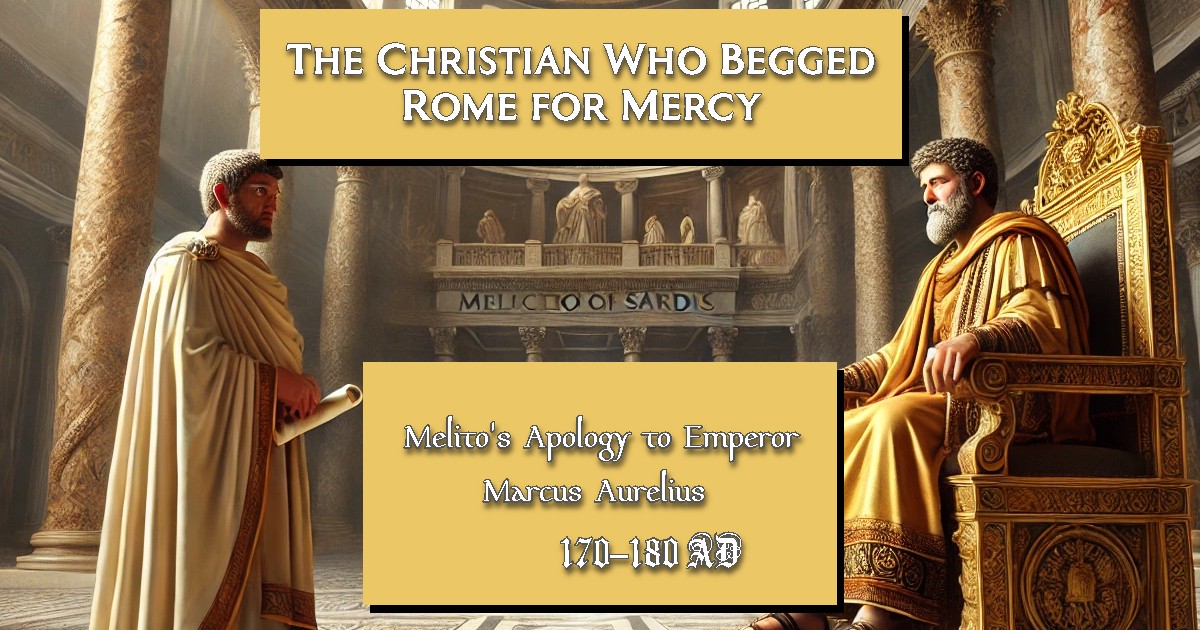The Christian Who Begged Rome for Mercy
Imagine writing a letter to the most powerful man in the world—the emperor of Rome—and daring to tell him he’s making a mistake.
That’s exactly what Melito of Sardis did in the late 2nd century, addressing Marcus Aurelius, the so-called “philosopher-king” of Rome. His letter, known as Melito’s Apology, was meant to convince the emperor that Christianity wasn’t a threat—but was actually the best thing to ever happen to the empire.
Melito’s argument is a strange mix of flattery, theology, and sheer desperation. He doesn’t challenge Rome—he tries to win it over. But was Melito defending a historical faith, or crafting a political myth to keep Christianity alive?
The Mystery of Melito’s Letter
Melito’s Apology survives only in fragments, quoted by later Christian writers like Eusebius of Caesarea. Unlike Justin Martyr, who wrote full-fledged philosophical defenses, Melito’s approach is more diplomatic, as if he’s walking on eggshells around the emperor.
The Key Points of Melito’s Argument:
- Christianity is Rome’s Best Ally – Instead of treating Christians as criminals, the empire should see them as loyal, moral citizens who only seek peace.
- Persecutions are a Mistake – Melito insists that Rome’s anti-Christian policies are based on misunderstandings and lies.
- Past Emperors Supported Christianity – He argues that earlier Roman rulers tolerated Christians, suggesting that Marcus Aurelius should do the same.
Melito isn’t fighting for a revolution—he’s begging for acceptance. But did he realize that, in trying to make Christianity look respectable, he was helping to rewrite its history?
The Myth of the Good Emperor
One of the strangest parts of Melito’s Apology is his idealized view of Rome.
He claims that previous emperors protected Christians, as if Christianity had always been part of the empire. But history tells a different story:
- Nero (64 CE) – Blamed Christians for the Great Fire of Rome, leading to mass executions.
- Domitian (81-96 CE) – Supposedly persecuted Christians as part of his broader crackdown on “atheists” (those who refused to worship Roman gods).
- Trajan (98-117 CE) – Ordered that Christians shouldn’t be hunted, but if accused, they must renounce their faith or die.
Melito presents an alternate version of history where Christianity was once safe—only to be threatened by recent bad policies. This plays into a myth that would later help Christians claim that their faith was always part of Rome’s destiny.
But if Christianity really had imperial protection in the past, why was Melito even writing this letter?
Gnosticism vs. Melito: The Fight Over Christ
Melito’s Christianity was firmly anti-Gnostic, meaning he saw Jesus as a real, historical figure—not just a mystical being.
In his surviving works, Melito:
- Emphasizes Jesus’ physical suffering—a direct counter to Gnostic ideas that Jesus only appeared to suffer.
- Calls Jesus “God who suffered”, reinforcing that Christ wasn’t just a messenger, but divine himself.
- Frames Christianity as the true philosophy, in opposition to mystical or esoteric traditions.
To Gnostics, Melito’s version of Christianity was too earthly, too Roman, too focused on power. They believed true salvation came not from belonging to an empire, but from escaping it.
So was Melito’s Jesus a historical savior—or was he crafting a politically convenient Christ for Rome?
The Mythicist Question: Was Melito Building a Legend?
For mythicists (those who argue Jesus was originally a mythical figure), Melito’s Apology raises some red flags:
- Why Does Melito Need Rome’s Approval?
- If Christianity was already well-established in history, why the need for imperial validation?
- Was Melito defending a faith based on real events, or was he constructing a story to fit Rome’s narrative?
- The “True” Religion of the Empire?
- Melito’s claim that Christianity was always compatible with Rome sounds suspiciously like revisionist history.
- Was he reshaping Christianity to make it the official faith of the empire?
A Philosopher’s Jesus
- Melito’s Jesus isn’t just a Jewish messiah—he’s a philosopher-king, a figure who fits perfectly into Marcus Aurelius’ world.
- This sounds less like a real historical person and more like an idealized figure crafted for Roman acceptance.
Did Marcus Aurelius Even Care?
There’s no evidence that Marcus Aurelius ever responded to Melito. In fact, under his rule, Christian persecutions continued, including the infamous execution of Justin Martyr.
Despite being a philosopher-emperor, Marcus wasn’t sympathetic to Christianity. He saw it as:
- Irrational – Christians refused to participate in Roman civic religion.
- A threat to stability – Their unwillingness to worship Roman gods was seen as treason.
- A rejection of philosophy – Marcus believed in stoicism, which emphasized rational self-control—not blind faith.
If Melito expected his letter to win over the emperor, he badly miscalculated.
The Legacy of Melito’s Apology
Melito’s Apology might not have saved Christians in his time, but it helped shape Christianity’s future.
- The Christian-Roman Alliance – Even though Melito failed, his argument that Christianity was Rome’s true faith helped lay the foundation for Emperor Constantine’s conversion in the 4th century.
- The Rewriting of Christian History – By claiming past emperors had protected Christians, Melito contributed to a historical myth that Christianity had always been part of Rome’s destiny.
- The Death of Gnostic Christianity – His focus on Jesus as a real, suffering figure helped push Gnostic ideas to the fringes of Christian thought.
A Diplomatic Failure, A Theological Victory
Melito of Sardis failed to stop Christian persecution under Marcus Aurelius. But his writings helped Christianity become a religion of power, not just survival.
Was he defending a historical Jesus, or was he helping to reshape Christianity into a political force?
Either way, his letter was one of the first steps toward making Christianity the religion of the empire—whether Rome wanted it or not.
References
- Eusebius of Caesarea, Ecclesiastical History
- Melito of Sardis, On the Passover (fragments)
- Candida Moss, The Myth of Persecution
- Bart Ehrman, Lost Christianities
- Richard Carrier, On the Historicity of Jesus
- Elaine Pagels, The Gnostic Gospels

